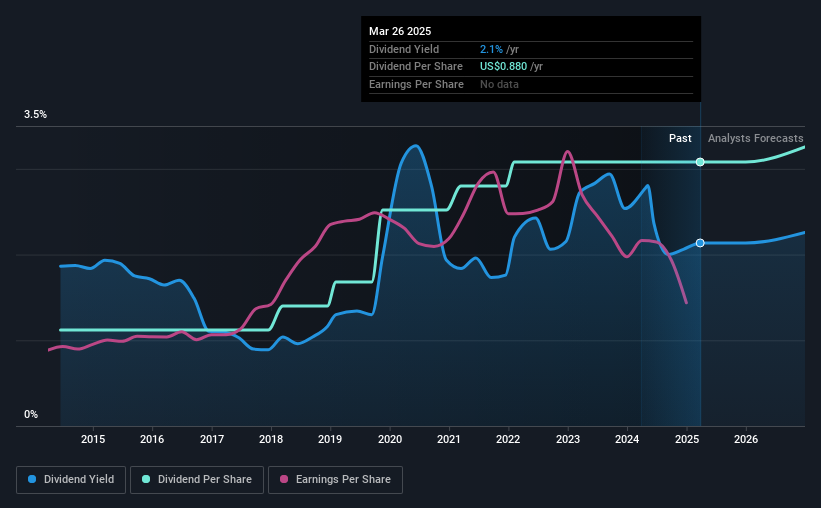- United States
- /
- Banks
- /
- NasdaqGS:FBNC
First Bancorp (NASDAQ:FBNC) Stock Goes Ex-Dividend In Just Three Days

First Bancorp (NASDAQ:FBNC) stock is about to trade ex-dividend in 3 days. The ex-dividend date is one business day before a company's record date, which is the date on which the company determines which shareholders are entitled to receive a dividend. The ex-dividend date is important because any transaction on a stock needs to have been settled before the record date in order to be eligible for a dividend. Meaning, you will need to purchase First Bancorp's shares before the 31st of March to receive the dividend, which will be paid on the 25th of April.
The company's next dividend payment will be US$0.22 per share, and in the last 12 months, the company paid a total of US$0.88 per share. Based on the last year's worth of payments, First Bancorp stock has a trailing yield of around 2.1% on the current share price of US$41.21. Dividends are an important source of income to many shareholders, but the health of the business is crucial to maintaining those dividends. So we need to investigate whether First Bancorp can afford its dividend, and if the dividend could grow.
If a company pays out more in dividends than it earned, then the dividend might become unsustainable - hardly an ideal situation. Fortunately First Bancorp's payout ratio is modest, at just 48% of profit.
Companies that pay out less in dividends than they earn in profits generally have more sustainable dividends. The lower the payout ratio, the more wiggle room the business has before it could be forced to cut the dividend.
View our latest analysis for First Bancorp
Click here to see the company's payout ratio, plus analyst estimates of its future dividends.

Have Earnings And Dividends Been Growing?
Businesses with shrinking earnings are tricky from a dividend perspective. Investors love dividends, so if earnings fall and the dividend is reduced, expect a stock to be sold off heavily at the same time. With that in mind, we're discomforted by First Bancorp's 10.0% per annum decline in earnings in the past five years. Such a sharp decline casts doubt on the future sustainability of the dividend.
Many investors will assess a company's dividend performance by evaluating how much the dividend payments have changed over time. First Bancorp has delivered 11% dividend growth per year on average over the past 10 years.
The Bottom Line
Should investors buy First Bancorp for the upcoming dividend? First Bancorp's earnings per share are down over the past five years, although it has the cushion of a low payout ratio, which would suggest a cut to the dividend is relatively unlikely. We think there are likely better opportunities out there.
Ever wonder what the future holds for First Bancorp? See what the four analysts we track are forecasting, with this visualisation of its historical and future estimated earnings and cash flow
Generally, we wouldn't recommend just buying the first dividend stock you see. Here's a curated list of interesting stocks that are strong dividend payers.
New: AI Stock Screener & Alerts
Our new AI Stock Screener scans the market every day to uncover opportunities.
• Dividend Powerhouses (3%+ Yield)
• Undervalued Small Caps with Insider Buying
• High growth Tech and AI Companies
Or build your own from over 50 metrics.
Have feedback on this article? Concerned about the content? Get in touch with us directly. Alternatively, email editorial-team (at) simplywallst.com.
This article by Simply Wall St is general in nature. We provide commentary based on historical data and analyst forecasts only using an unbiased methodology and our articles are not intended to be financial advice. It does not constitute a recommendation to buy or sell any stock, and does not take account of your objectives, or your financial situation. We aim to bring you long-term focused analysis driven by fundamental data. Note that our analysis may not factor in the latest price-sensitive company announcements or qualitative material. Simply Wall St has no position in any stocks mentioned.
About NasdaqGS:FBNC
First Bancorp
Operates as the bank holding company for First Bank that provides banking products and services for individuals and businesses.
Flawless balance sheet established dividend payer.
Similar Companies
Market Insights
Community Narratives



